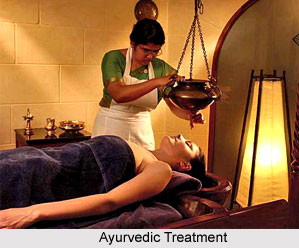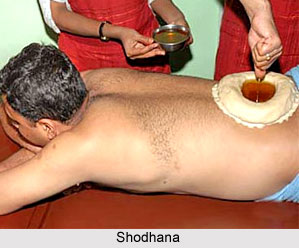 Ayurveda is a holistic science. The word ayurveda is comprises two words- Ayu and Veda. Ayu is life and Veda signifies knowledge or science hence the literal meaning of ayurveda is the science of life. The concept of ayurveda is to promote health rather then to treat disease. So ideally ayurvedic medication is solely based on the overall development of mind and body. The rule of Ayurvedic medication is that it probes to discover the root of any disease and totally eliminates it from the entire system of the patient
Ayurveda is a holistic science. The word ayurveda is comprises two words- Ayu and Veda. Ayu is life and Veda signifies knowledge or science hence the literal meaning of ayurveda is the science of life. The concept of ayurveda is to promote health rather then to treat disease. So ideally ayurvedic medication is solely based on the overall development of mind and body. The rule of Ayurvedic medication is that it probes to discover the root of any disease and totally eliminates it from the entire system of the patient
The Ayurvedic concept of disease defines two terms, Vikruti and Prakruti. Vikruti is the abnormal or diseased condition of the body while prakruti refers to the normal physiological and mental state. The main aim of Ayurvedic medication is to help a person remain healthy as well as to treat a person suffering from disease. According to Ashtang Ayurveda, when the bodily activities of a human being occur at an optimum level and the individual is physically, mentally and spiritually balanced, the condition is known as health.
According to the renowned Ayurvedic sages Charaka and Vagbhata when all the three doshas, namely vata, pitta and kapha are in equilibrium in accordance with the body type; all the seven dhatus or tissues (namely rasa, rakta, mansa, med, asthi, majja, shukra) have adequate strength and coordination; agnis or the digestive fires have a balanced concentration resulting in proper appetite, digestion and assimilation; the waste materials or malas (namely mutra, purisha and sweda), are being produced and purged in a regular manner; the sense organs or the indriyas are aptly carrying out their usual function and the mind is serene and calm, then only it can be said that the individual is healthy. If all the above conditions are maintained within the body, the individual experiences both physical and mental bliss and contentment. This very crux of ayurveda finds a definite dimension amidst the procedure of ayurvedic medication. Medicine according to ayurveda is not administered just to eliminate the disease but also to strike that balance between nature, life and spirit.
In keeping with this there are primarily six kinds of "chikitsa"(treatment),available in Ayurvedic medication. These are known as Shodana or Purification , Shaman or Palliation , Pathya Vyavastha or Diet regulation , Nidan parivajan or Prevention of diseases , Satvavajaya or mental cleansing and Rasayana therapy or rejuvenation therapy
 Shodhana is an archetypal ayurvedic medication which involves wiping away the disturbing elements, causing somatic or psycho-somatic disorders from the body matrix. "Panchakarma" is usually the method followed in shodhan. Panchakarma is the five-steps Ayurvedic programme, necessary for the fundamental purification and anti-poisoning treatment. These 5 ways are Vamana, Virechana, Nasya, Basti and Raktamokhshana. Vamana is the ejection or medicated emesis of Kapha toxins (bronchitis, cold, cough ) accumulated in the body and respiratory tract. Any type of congestion will disappear along with breathlessness and sinus.Virechana cleanses the body of Pitta toxins collected in the liver and gallbladder. It cures gastro-intestinal disorders. Nasya is the application of medicated oils through nasal opening to remove Kapha toxins from the head and neck areas. It is highly effective for fighting with diseases like Trigeminal Neuralgia, Bel`s Palsy, headaches of Hemiphlegia origin, memory weakness etc. Basti throws away all the three "dosas", Vata-Pitta-Khapa toxins through the colon. Medicated oil or ghee and an herbal decoction are administered as enema .It provides remedies for colitis, spondylitis, Hemiphlegia, irritable bowel syndrome, sexual debility etc. Raktamokshana is the blood-purifying process. It washes away toxins that intrude through the gastro-intestinal tract.
Shodhana is an archetypal ayurvedic medication which involves wiping away the disturbing elements, causing somatic or psycho-somatic disorders from the body matrix. "Panchakarma" is usually the method followed in shodhan. Panchakarma is the five-steps Ayurvedic programme, necessary for the fundamental purification and anti-poisoning treatment. These 5 ways are Vamana, Virechana, Nasya, Basti and Raktamokhshana. Vamana is the ejection or medicated emesis of Kapha toxins (bronchitis, cold, cough ) accumulated in the body and respiratory tract. Any type of congestion will disappear along with breathlessness and sinus.Virechana cleanses the body of Pitta toxins collected in the liver and gallbladder. It cures gastro-intestinal disorders. Nasya is the application of medicated oils through nasal opening to remove Kapha toxins from the head and neck areas. It is highly effective for fighting with diseases like Trigeminal Neuralgia, Bel`s Palsy, headaches of Hemiphlegia origin, memory weakness etc. Basti throws away all the three "dosas", Vata-Pitta-Khapa toxins through the colon. Medicated oil or ghee and an herbal decoction are administered as enema .It provides remedies for colitis, spondylitis, Hemiphlegia, irritable bowel syndrome, sexual debility etc. Raktamokshana is the blood-purifying process. It washes away toxins that intrude through the gastro-intestinal tract.
Shamana another interesting ayurvedic medication, succeeding Shodhan or detoxification, is urgent for correcting the imbalances of all the "doshas" in the body-construct. In this course of medication, appetizers, digestives, palliatives and sedatives catalyze "Agni"(cauterization) in the internal constitution of the body, inactivates the bad humors or "doshas" and ultimately restores their balance. Above all, exposure to fresh air, to the sun stimulates fast recovery.
A proper dietary regimen, prescribed by the physician is indispensable for seeking optimum metabolism. Ayurveda believes that food regulates biological activities, physiological processes and emotional status and Pathya Vyavastha or Diet regulation is indeed a very important part of the ayurvedic medication. Not just detoxification or striking the balance in doshas, locating the factors causing the health issues is also important in the ayurvedic treatment procedure.
Nidan Parivajan, the important ayurvedic medication, clinically locates the factors causing health-issues and skillfully obstructs one`s susceptibility to diseases.
Satavahana, another ayurvedic medication heals the agony of the psyche. This instills courage, boosts the level of confidence, and increases memory -power and intensity of concentration in a wretched soul. Ayurvedic medication has answer to almost every health problem. When life looses away its luster, when youth fades or when beauty lacks its appeal then the ayurvedic medication, Rasayana is the only ray of hope. This Ayurvedic boon regains the lost strength and vitality, and obstructs the approach of premature ageing.
By using ayurvedic medication physical and mental health is achieved without any side effects as the natural elements of herb aids in bringing "arogya" whilst striking that perfect balance. Ayurvedic medication is non-invasive and non-toxic and helps in stress-related, metabolic, and chronic conditions.





